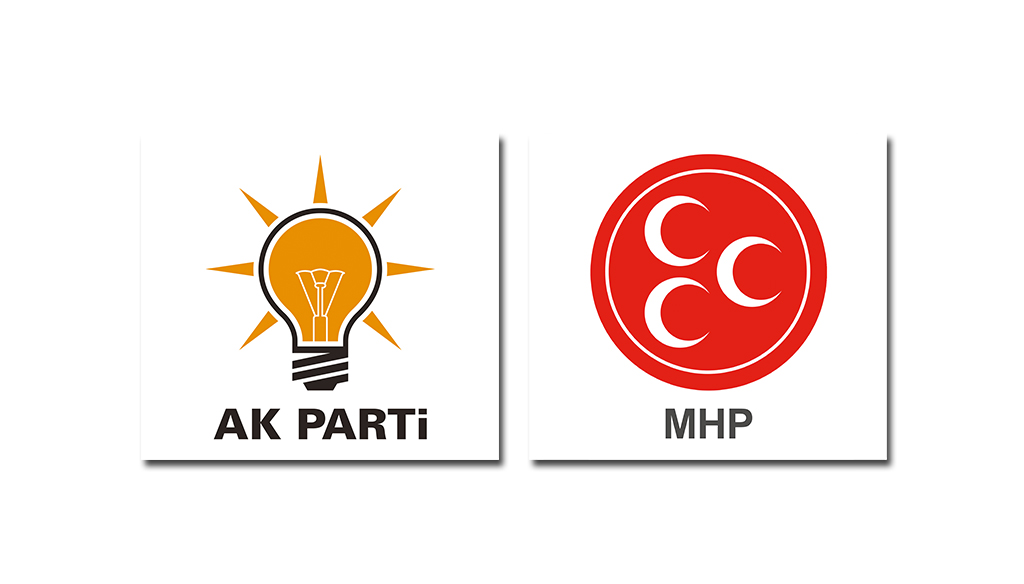
AK Party, MHP agree on domestic, foreign policy issues
The ongoing negotiations between the AK Party and MHP..
Share
In the first days of 2018, Devlet Bahçeli, chairman of the Nationalist Movement Party (MHP), declared that his party was open to forming a pre-electoral coalition with the ruling Justice and Development Party (AK Party) for the 2019 parliamentary elections, which will be held on the same day as the presidential election. Along with the positive approach from the AK Party, pre-electoral coalitions became one of the hot topics of Turkey's political agenda. President Recep Tayyip Erdoğan announced that it is important to form a national alliance based on national unity that would be open to each party respectful of the country's national values, unity and solidarity.
Since it is not possible to establish a formal pre-electoral coalition under the current election laws, the need for a legal amendment to the Election Law and Political Parties' Law resulted in the formation of a commission to establish the legal framework for the alliance. The ongoing negotiations between the AK Party and MHP are yet to yield a solution; a public announcement about the content of this legal arrangement is expected in the following days.
Indeed, even if there is not yet a formal alliance between the AK Party and MHP, the relatively long-term rapprochement between these parties after the July 15, 2016 coup attempt had reflections on both domestic and foreign policy issues. Both parties have accommodated each other to solve deep-rooted problems even at the expense of sacrificing their own political agenda. The latest example of this rapprochement has been seen during Operation Olive Branch.
Before dealing with the effects of this rapprochement on foreign policy, especially Operation Olive Branch, it is important to evaluate its effects on domestic politics since it has spilled over from the domestic to the international issues. After the 2016 coup attempt, all political party representatives in Parliament came together to stand against the coup attempt. Apart from the Peoples' Democratic Party (HDP), all parties and their supporters attended a rally in Yenikapı Square to show their stance against the coup. Nonetheless, the main opposition Republican People's Party (CHP) left its support for the Yenikapı spirit in time and left this consensus-based spirit. After that, the AK Party and MHP maintained this spirit that transformed into a possible pre-electoral coalition. This was the first phase of rapprochement between the two parties at a domestic level.
The second striking phase of this rapprochement was the approval of the constitutional referendum on April 16, 2017. Although Bahçeli was opposed to changing the governmental system for a long time, he understood the requirement for making significant changes to the existing system to provide stability and prevent further coup attempts after July 15. As a result of collaboration between the two parties, the constitutional amendment in Parliament was accepted to bring it to a referendum. This amendment was approved with 51.4 percent of the voters and the long-lasting problem of the governmental system in Turkey was solved.
The collaboration during the preparation of adjustment laws that regulates existing legislation with the approved constitutional amendments was the third phase of this rapprochement. Even though the adjustment laws have not come to Parliament yet and are expected in March, the MHP declared that it will support the passage of the laws in Parliament.
The fourth and one of the most outstanding examples of rapprochement between the two parties is the possibility of an electoral coalition for the 2019 elections. The mutual announcements and ongoing negotiations held by representatives from both parties show that they are about to form an electoral coalition for the 2019 parliamentary elections. Furthermore, Bahçeli's announcement that "the MHP will not present a candidate for the presidential elections in 2019. It will support Recep Tayyip Erdoğan for the presidency in line with our party's loyalty to the unity and togetherness of Turkey" already assures the alliance for the presidential election.
What about foreign policies?
The lines of rapprochement between both parties are not limited to domestic policy. The MHP also gives support to the AK Party government and Erdoğan in their opposition to the international system related to Turkey's foreign policy. For instance, while Erdoğan denounced the EU for having double standards on Turkey, especially after the coup attempt, Bahçeli strongly supported Erdoğan's criticism. Thus, foreign policy also became one of the areas that both parties agree on most of the time.
Operation Olive Branch has been the latest example of consensus between the two parties. The Turkish military launched a counterterrorism operation on Jan. 20 in the Afrin region of northwestern Syria to protect its border from the terror threats of the PKK-affiliated Democratic Union Party's (PYD) People's Protection Units (YPG) forces and rescue the people living in the region. After the operation started, Bahçeli made supportive statements on the operation to Erdoğan over the phone. Furthermore, members of the provincial branches of the MHP have organized small-scale rallies throughout the country to show their respect and support for the operation. Erdoğan expressed his appreciation to Bahçeli and the MHP for their contribution and support during the process.
In conclusion, the rapprochement between the AK Party and the MHP after the July 15 coup attempt reflects positively on both domestic and foreign policy. It is possible to say that after the announcement of the legal framework for electoral alliances, this rapprochement will turn into stronger collaboration.
[Daily Sabah, 10 February 2018]
Tags »
Related Articles






